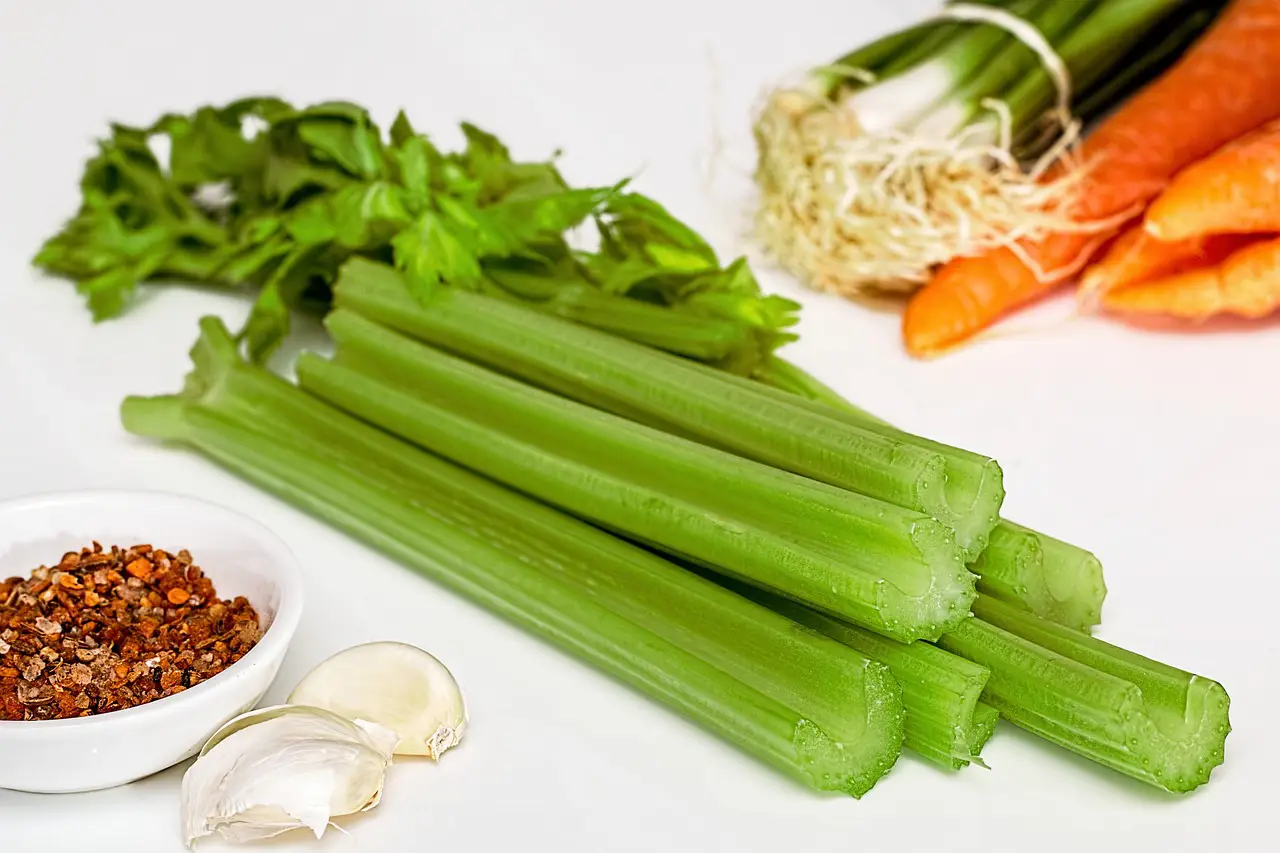This posting is part of Coupang Partners activity, and I receive a certain amount of commission accordingly.
Celery is a low-calorie food rich in nutrients such as vitamin K, vitamin C, potassium, folate, and vitamin B6, as well as enzymes and insoluble dietary fiber, making it a great choice for dieting.
When consumed, it helps promote digestion and has a positive effect on weight loss. Additionally, due to its high water and electrolyte content, it is effective in supplying hydration to the body and preventing dehydration. Furthermore, celery may help regulate cholesterol levels and contribute to cancer prevention. In this article, we will explore the benefits of celery, along with its potential side effects, how to consume it, and how to store it properly.

Nutritional Information
A cup of finely chopped celery contains various nutrients. The values in parentheses represent the percentage of the recommended daily intake for adult women.
- Calories: 16 kcal
- Fat: 0g
- Protein: 1g
- Dietary Fiber: 5g
- Vitamin K: 6mg (37%)
- Folate: 36mg (9%)
- Vitamin A: 22mg (9%)
- Potassium: 263mg (8%)
- Vitamin C: 1mg (5%)
- Calcium: 40mg (4%)
- Vitamin B6: 0.08mg (4%)
Celery Benefits
Celery Promotes Digestion and Alleviates Swelling
Celery is rich in insoluble dietary fiber, which aids in the digestive process and is effective in relieving constipation. It also helps improve the gut environment, contributing to natural detoxification.
With its high water content and excellent diuretic properties, celery helps maintain the body’s fluid balance, promotes the elimination of excess fluids, and is effective in reducing swelling.
Celery Helps with Weight Loss
Celery is an ideal food for dieting, as it is low in calories while being rich in essential nutrients. A large stalk contains only about 10 kcal and is packed with various compounds that promote fat metabolism, making it effective for weight loss. Most importantly, celery provides a sufficient amount of antioxidants and nutrients while keeping the calorie intake low, which is one of its major benefits.
Reduces Blood Cholesterol Levels
Celery contains a compound called butylphthalide (BuPh), which not only gives it its unique flavor and aroma but also helps lower bad cholesterol. According to a study conducted at the University of Chicago and published in The New York Times, the butylphthalide found in four celery stalks consumed daily can reduce LDL cholesterol by about 7%.
Additionally, research from the Department of Pharmacology at the National University of Singapore found that in an experiment with rats fed a high-fat diet for 8 weeks, the group that consumed celery extract had lower blood fat levels compared to the group that did not.
Helps Reduce Inflammation
If you are experiencing joint pain, lung diseases, asthma, or acne, consuming celery may be beneficial. Celery is rich in antioxidants, including flavonoids, and polysaccharides that help reduce inflammation. These compounds remove free radicals and reduce inflammatory responses, contributing to overall health improvement. Additionally, chronic inflammation is linked to conditions like cancer, heart disease, and arthritis, so regularly consuming anti-inflammatory foods can be beneficial for maintaining good health.
Effective in Cancer Prevention
A study conducted by the University of Illinois found that luteolin, a flavonoid compound in celery, inhibits the growth of pancreatic cancer cells. Additionally, another study reported that regular consumption of celery can help prevent the formation of breast cancer cells.
Side Effects and Precautions
- Excessive consumption of celery can cause diarrhea or abdominal pain.
- Pregnant women who consume large amounts of celery or celery seeds may risk bleeding or uterine contractions. However, consuming it in moderation as part of a balanced diet is not problematic.
- People with kidney diseases should avoid consuming large amounts of celery.
- Celery can cause allergic reactions, especially for those allergic to birch pollen or mugwort, as they may also be sensitive to celery.
How to Choose Good Celery
When selecting celery, look for stalks that are firm, straight, and not limp. Fresh celery is characterized by stalks that break easily when bent slightly. If the leaves are still attached, choose those with a vibrant and fresh color. As a general tip, the darker the celery, the stronger its aroma tends to be.
How to Store Celery
After bringing celery home, it’s best not to wash or cut it immediately. Washing or cutting it beforehand can cause it to lose freshness quickly and shorten its storage time. Additionally, freshly cut celery contains more nutrients than celery that has been refrigerated for several hours.
When storing celery, it’s important to keep it dry, and the ideal storage period is about 5 to 7 days. After this period, the stalks may become limp, and the nutrients can degrade. It’s also recommended to avoid freezing celery, as freezing and thawing can cause it to wilt and lose its texture.
Preparation and Consumption
When preparing celery, first cut off the white, firm base, then wash it thoroughly and cut it into the desired size. The leaves of celery can be used in various dishes, such as soups or salads, and, like the stalks, they contain many vitamins and minerals.
Steaming celery helps retain its flavor while preserving most of its nutrients (up to 99%).



Leave a Comment